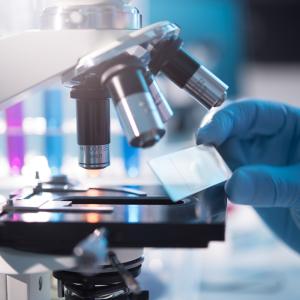
Medical oncologist Dr. Arjun V. Balar was the overall lead principal investigator of the KEYNOTE-057 trial.
Photo: NYU Langone Staff
New research from an international clinical trial led by NYU Langone Health investigators helps provide alternative options for people suffering from bacillus Calmette-Guérin (BCG)–unresponsive non-muscle invasive bladder cancer. This is the first new treatment for the disease to be approved in the United States since 1998.
Pembrolizumab Fills an Unmet Need for Patients
For patients with BCG-unresponsive high-risk, non-muscle invasive bladder cancer, the only curative treatment is radical cystectomy, a surgery with high morbidity and a 4 percent mortality rate. Patients have few available alternative options if they are ineligible for or elect not to undergo the procedure. Earlier studies showed pembrolizumab, a PD-1 inhibitor, elicited durable antitumor activity in patients with metastatic urothelial carcinoma. The KEYNOTE-057 (NCT02625961) phase 2 trial was designed to study pembrolizumab’s effect on patients with BCG-resistant carcinoma-in-situ (CIS) with or without papillary tumors, in which upregulation of the PD-1 pathway has been observed.
“High-risk, non-muscle invasive bladder cancer is a serious disease, characterized by frequent recurrences and progression,” says Arjun V. Balar, MD, associate professor in the Department of Medicine and director of Genitourinary Medical Oncology Program at NYU Langone’s Perlmutter Cancer Center. “As a physician who specializes in the management of bladder cancer, it is encouraging to now have a new treatment option for patients whose cancer has become unresponsive to BCG treatment.”
KEYNOTE-057 is the first study to demonstrate the effectiveness of a novel systemic immunotherapy for BCG-unresponsive high-risk, non-muscle invasive bladder cancer. The trial showed that pembrolizumab elicited a 41.2 percent complete response rate in patients after the initial 4 treatments. After a year of treatment, half of those (20 percent) maintained a complete response.
Dr. Balar says that no new safety signals were detected in patients during the trial. For patients whose cancer recurred after treatment with pembrolizumab, the window of opportunity for cystectomy was preserved.
Practice-Changing Drug Approvals for Patients with Bladder Cancer
Dr. Balar, who was the overall lead principal investigator of the KEYNOTE-057 trial, is among a number of key investigators at Perlmutter Cancer Center who are international leaders in developing more effective, better-tolerated treatments for patients with bladder cancer.
The approval of pembrolizumab for BCG-unresponsive non-muscle invasive bladder cancer is the third practice-changing drug approval Dr. Balar has led in the last three years. In early 2017, the U.S. Food and Drug Administration (FDA) approved atezolizumab (Tecentriq®) and pembrolizumab as first-line treatments for patients with advanced bladder cancer who are too medically frail to take the standard-of-care chemotherapy agent, cisplatin. These immune system–boosting agents were the first-ever FDA-approved treatments for cisplatin-ineligible bladder cancer.
In 2019, Gary D. Steinberg, MD, a member of the faculty in the Department of Urology and director of Perlmutter Cancer Center’s Urology Bladder Cancer Program, joined NYU Langone to complement ongoing efforts in the care of patients with bladder cancer. Dr. Steinberg was a scientific advisor for Merck on the KEYNOTE-057 trial and is principal investigator for the KEYNOTE-676 (NCT03711032) phase 3 study of BCG with or without pembrolizumab for high-risk non-muscle invasive bladder cancer that is persistent or recurrent following BCG induction. Together, Dr. Balar and Dr. Steinberg are working to develop the next best treatments for patients with this disease.
“The approval of pembrolizumab is paradigm changing and offers patients a possible therapy to preserve their native bladder function while eliminating their cancer,” says Dr. Steinberg. “This is a breakthrough for some patients and most likely will lead to new combinations of therapy for this aggressive form of localized bladder cancer that will hopefully benefit additional patients. This will lead to further research and innovative treatments for the bladder cancer community and clearly is a significant advance.”
“The study demonstrates local activity in the bladder from a systemically administered treatment,” Dr. Balar adds. “This is promising since systemic immune activation is what ultimately leads to long-term durable remissions of cancer.”
Disclosures: Arjun V. Balar, MD, has performed contracted research for Genentech, Merck, AstraZeneca/MedImmune, Nektar, Seattle Genetics, and Immunomedics. He has served in a consultant/advisory role for Genentech, Incyte, Janssen, Merck, Pfizer, AstraZeneca/MedImmune, Nektar, and Seattle Genetics. He has had speaking engagements with Genentech, Merck, and AstraZeneca/MedImmune. He serves on Steering/Scientific Advisory Committees at Merck and Nektar.
Gary D. Steinberg, MD, is a member of clinical trial protocol committees for Merck, Bristol-Myers Squibb, Janssen, Cold Genesys, Pfizer, PhotoCure, and Fidia Farmaceuticals. He is or has been a scientific advisor or consultant within the past five years for Heat Biologics, Cold Genesys, PhotoCure, Merck, Roche/Genentech, CicloMed, TARIS Biomedical, MDxHealth, Fidia Farmaceuticals, UroGen Pharma, Ferring Pharmaceuticals, Aduro Biotech, Boston Scientific, Bristol-Myers Squibb, AstraZeneca, Pfizer, Janssen, EpiVax Oncology, Natera, FKD Therapies Oy, EnGene Bio, SesenBio, BioCanCell, Nucleix, and Ipsen. Dr. Steinberg has equity or stock options in EpiVax Oncology and UroGen Pharma.

